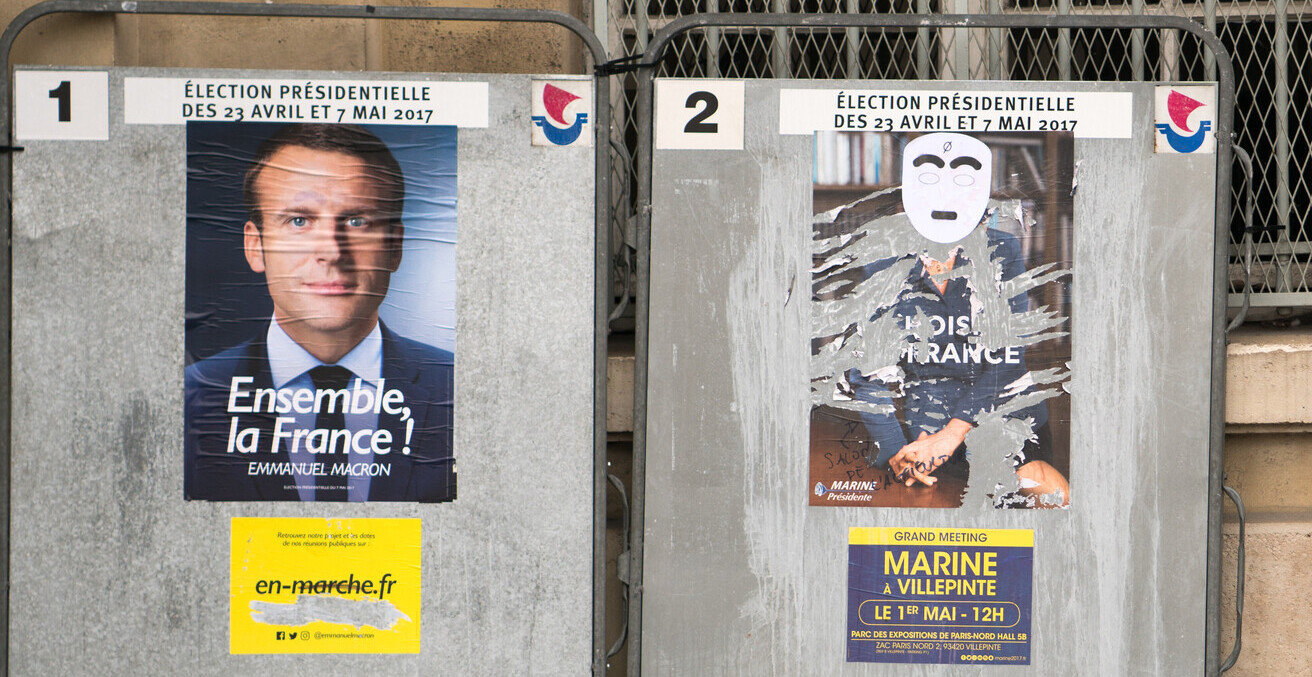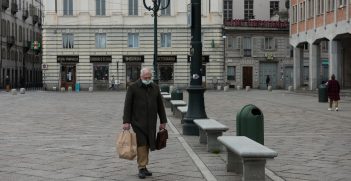The French Connection

Emmanuel Macron emerged victorious in the first round of the French presidential elections, setting up a rematch against Marine Le Pen. Though his prospects remain strong, the French political landscape is changing as populism and mistrust of politicians continues to grow.
Australian and French elections are usually thought of in the same breadth, but the clash between President Emmanuel Macron and Prime Minister Scott Morrison over the submarine contract has sparked some mutual interest. The claim by Macron that Morrison had lied to him over the cancellation of the French submarine contract, with his “I don’t think I know” response to an Australian journalist, brought trust issues into Australian domestic politics as well as a curiosity about what sort of leader Macron was in France.
Macron burst on the scene at the last presidential election in 2017 as a centrist candidate outflanking the traditional parties of the Socialists on the centre-left and the Republicans on the centre-right. In the French tradition of the run-off, where several candidates run in the first round, and only the two highest vote-getters in the second round, Macron defeated the far-right populist candidate Marine Le Pen. As they say in France, in the first round you vote with your heart, the second round with the head. Accordingly, the Socialist and Republican voters licked their first round wounds and got behind Macron in the second round.
Now five years later, it will be Macron vs Le Pen again in the run-off and the same “heart and head” decision for France. But how did first round votes compare to last election?
First, there was a marginally lower turnout than five years ago: 78 percent v 73.8 percent, as France has voluntary not compulsory voting. Macron did marginally better in the first round this time. For instance, this year in the first round, Macron secured 27.8 percent of the vote compared to 23.1 percent for Le Pen. In 2017, both candidates received a lower share of the vote, 24 percent for Macron and 21.3 percent for Le Pen.
Second, at least one in three voters backed the far-right. Since Marine Le Pen’s father, Jean-Marie Le Pen advanced to the second round of the presidential elections in 2002 against Centre Right President Jacques Chirac, the far-right has become a mainstay in the French political landscape. In fact, this election signifies the end of the two-party system and led to, in effect, a three-party system where non-extreme parties are a minority. A third of French voters voted for centre and centre-right, a third voted for the far-right, and a third voted for the hard left, such as the old communist party and the ecologist party.
As has been the trend since 2002, the classic left and right vote has continued to collapse. The French right candidate Valerie Pécresse (Les Républicains) ranked 5th at only 4.8 percent, and French left candidate and mayor of Paris Anne Hidalgo (Parti socialiste) ranked 10th with 1.8 percent. As both candidates failed to score above five percent in the first round of polling, it also means that the candidates will not have their campaign expenses reimbursed. Remarkably, only ten years ago, the “Classic” or traditional left and right represented more than 50 percent of voters. They represent less than ten percent today.
So, as we move into the run-off, what are Macron’s challenges? Sure, he is having a tough two weeks between the two rounds, but he also has a unique opportunity to establish his governments legitimacy. If Macron wins, he will be the first French president with a parliamentary majority to be reelected since Charles de Gaulle in 1965. But he does need to shed his woke merchant-banker image a bit to appeal to working class voters, particularly those of the old hard left that may be flirting with Le Pen. Playing statesman on the world stage is an important responsibility of the president of France, especially in the context of the Russian-Ukraine crisis, but he also has to look after the French working class in the outer suburbs and the provinces.
What are the implications for Franco-Australian relations? It is likely that a re-elected Macron will have cool relations with a re-elected Scott Morrison and a chance to start anew with Anthony Albanese if Labor is elected on 21 May. There is more to the French connection than submarines to Australia, and despite modest levels of bilateral trade, France is a significant source of foreign investment and a strategic player in Europe and on the world stage.
If Le Pen is elected, the relationship may be completely different with Australia. Even if the far-right candidate does not want to exit the EU anymore (compared to what she was saying a couple of months ago only), she plans to reinforce the roles of each country within the alliance, meaning the EU will have significantly less power as a regional organisation to deal with other “big nations” or group of nations, such as China or ASEAN countries. For Australia, it probably means that the Indo-Pacific axis from Paris to Canberra through Delhi, so important for Emmanuel Macron, won’t be a priority anymore. And there remains uncertainty about future security arrangements and defence as Le Pen declared there should be a “strategic rapprochement” between NATO and Russia once the war launched by Moscow against Ukraine had ended. She confirmed that she will pull France out of NATO’s military command, consistent with her comments during the submarine episode, highlighting a “serious diplomatic crisis between allied countries.”
Can we read anything into the French elections? Or into the rise of right-wing populism emerging in Europe? There are elements of such populism in Australia, but the preferential and compulsory voting system consolidates the two party system, at the House of Representatives level at any rate, whether democratically elected governments are made and unmade. But Australians will be watching carefully to see if Macron can defeat Le Pen again to stave off the challenge of the far-right in the democratic west.
Natanael Bloch is French and is a Group Account Director at Thrive pr communications in Melbourne.
Tim Harcourt is Australian and is Industry Professor and Chief Economist at IPPG, University of Technology Sydney.
Both are members of the European Union Australia Leadership Forum.
This article is published under a Creative Commons License and may be republished with attribution.





